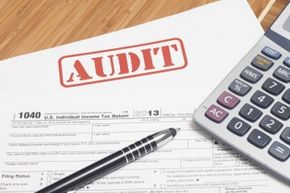 “An audit can be scary, but when you see a letter from the IRS, don’t panic. It could just as easily being a much less stressful matter.©iStock/Thinkstock
“An audit can be scary, but when you see a letter from the IRS, don’t panic. It could just as easily being a much less stressful matter.©iStock/Thinkstock
Unless you’re due a hefty refund, being contacted by the Internal Revenue Service might make even the most scrupulous taxpayer anxious. But there are several reasons you might hear from the IRS. And while neither are probably ever forms of communications you’ll be excited about receiving from the IRS, two of the most common — the audit and the tax notice — are very different.
First, a tax notice, or letter, is the less serious of the two, and is when the IRS is checking to ensure your taxes are filed accurately and the reported tax liability is correct. Each tax notice deals with one specific issue, and there are lots of reasons the IRS sends them out.
Some tax notices are actually to the taxpayer’s benefit, and are regarding refunds, protection against identity theft, qualifications for additional tax credits, or suggestions to file for the Earned Income Credit. However, some include bad news, too. For instance, the IRS may inform you that you owe taxes or a penalty; that it found a miscalculation on your return; it used your refund to pay back taxes; or deny you an extension.
A few IRS notices are simple bookkeeping details such as requests for an updated name or address, confirmation of a return receipt, or the issue of a replacement refund check.
Audits are a little more ominous. Both individuals and businesses are subject to audits. The IRS may call to alert you to an audit, but in all cases, you will receive a letter informing you of the news. Tax notices are sometimes used to gather specific information for an audit, including dependent exemptions, filing status, income and withholdings. However, the audit itself is far more in-depth. Don’t worry about what you’ll need; the IRS will tell you exactly what records you must produce. Records might include cancelled checks, paid bills, invoices, deposit slips and credit card receipts — sometimes electronic copies can be acceptable. The entire process may happen through the mail, or you may meet personally with the IRS auditor in your home, an IRS office, your business or your accountant’s office.
Audits sometimes occur when returns seem suspicious or when whistleblowers identify issues. However, there are also less sinister reasons. Perhaps documents from your employer, such as your W-2 form, don’t match your return. Maybe other people you do business with are being audited, so the IRS decides to check you out, as well. A computer program may even identify you as a person of interest.
There’s no specific length for an audit. A lot depends upon its purpose, the availability of people and documents, and whether you agree with the findings. It’s even possible for the audit to have a happy ending. Maybe there’s no change in your tax filing and you go on with your life. However, the IRS may require updates to your return. If you agree, each party takes the necessary steps, and the case is closed. If you are opposed to the findings, you’ll be referred to a manager or a mediator. You’re also allowed to file an appeal. Best-case scenario: You wake to find the audit was just a nightmare, and your tax problems simply fade away.
Lots More Information
Related Articles
- How Income Tax Audits Work
- How Tax Evasion Works
- 10 Common Miscellaneous Expense Deductions
- How the IRS Works
- 10 Myths About IRS Audits
Sources
- Internal Revenue Service. "IRS Audits." October 10, 2014. (October 30, 2014) http://www.irs.gov/Businesses/Small-Businesses-&-Self-Employed/IRS-Audits
- Internal Revenue Service. "Understanding Your IRS Notice or Letter." October 22, 2014. (October 30, 2014) http://www.irs.gov/Individuals/Understanding-Your-IRS-Notice-or-Letter
- Internal Revenue Service. "What kind of records should I keep?" September 5, 2014. (October 30, 2014) http://www.irs.gov/Businesses/Small-Businesses-&-Self-Employed/What-kind-of-records-should-I-keep



























